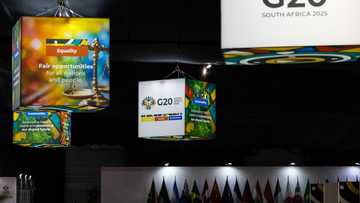600MW for N1.49tn: Nigeria Targets Power Export to 15 West African Countries
- The Federal Government of Nigeria has said it is targeting about N1.49 trillion in annual revenue from electricity exports to 15 West African countries
- It disclosed that Nigeria is currently allocating 600MW for its bilateral power trade agreements with the countries each day
- Nigeria successfully conducted a grid synchronisation test with 15 West African countries for four hours on November 8, 2025
Oluwatobi Odeyinka is a business editor at Legit.ng covering energy, the money market, tech and macroeconomic trends in Nigeria
The Federal Government of Nigeria has said it is targeting nearly $1billion (about N1.49trillion) in annual revenue from electricity exports to 15 members of the Economic Community of West African States come June 2026.
The Minister of Power, Chief Adebayo Adelabu, disclosed this at a press conference on Wednesday in Abuja, PUNCH reported.
The minister announced that Nigeria successfully conducted a grid synchronisation test with 15 West African countries for four hours on November 8, 2025.

Source: Original
The exercise positions Nigeria as a strategic player in the electricity sector in the subregion under the West African Power Pool, the minister said.
Nigerian Tribune reported that the November synchronisation exercise was conducted between 05:04 am and 09:04 am, involving the Nigerian grid, and included the Niger Republic, parts of Benin and Togo, and the rest of West Africa’s interconnected systems covering the remaining West African countries.
The minister said the four-hour-long power transmission across national borders operated at a single stable frequency, suggesting that Africa is now technically capable of functioning as a unified power bloc.
The minister further noted that the government is working toward establishing a permanent grid synchronisation by June 2026. He said the grid is expected to undergo a second 48-hour test run after all preparations have been made.
Nigeria allocating 600MW
Nigeria is currently allocating 600MW for its bilateral power trade agreements each day, the Executive Director, Market Operations at the Nigerian Independent System Operator, Edmund Eje, said.
Data published by the Nigerian Electricity Regulatory Commission (NERC) indicates that Nigeria offers some of the lowest electricity tariffs in the West African region.
NERC’s statistics reveal that the country’s average approved end-user rate stands at around $0.07 per kilowatt-hour (about ₦100.27/kWh), which is only 35.71 per cent of the roughly $0.19/kWh charged in many neighbouring nations.
Further analysis of the numbers shows that exporting 600MW, which is equivalent to 600,000 kilowatts, at the dominant regional tariff of $0.19 per kilowatt-hour would generate about $114,000 every hour, according to Punch.
This translates to approximately $2.73 million in daily earnings and about $998.6 million annually.

Source: Twitter
Minister says power export will benefit Nigerians
The minister further noted that exporting power to West African countries will directly benefit the Nigerian people.
He said:
“As ongoing transmission expansion projects, including the North-Core line, the Ajegunle 330 kV Substation, the Kaduna–Kano transmission upgrades, and the Gwagwalada–Gurara connection, are completed, synchronisation will help deliver more reliable power to homes and industries nationwide."
Adelabu added that Nigeria's grid capacity stands at 8,500MW, stating that with a generation of 8,000MW alone, power transmission from the grid would be conducted without a hiccup.
He, however, noted that while Nigeria has the capacity and facility to generate more power, it needs more investment to meet demand from other countries.
Discos raked in billions in electricity bills
Legit.ng had earlier reported how electricity distribution companies improved collection efficiency in the last month.
Electricity distribution companies collected a total revenue of ₦565 billion in the second quarter of 2025. Eko, Ikeja, and Abuja DisCos collected the highest bills.
Meanwhile, many industries and businesses have exited the national grid due to its unreliability, as they opt for self-generation of power.
Source: Legit.ng





